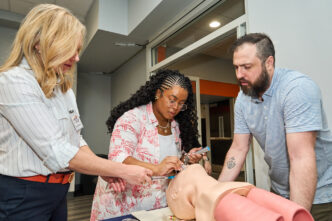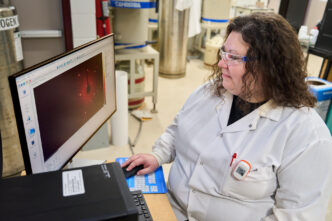CLEMSON, South Carolina – Clemson University scientists have taken another step forward in their quest to find a cure for a notorious parasite that has infected more than 40 million Americans and many times that number around the world.
A newly released study led by Zhicheng Dou of the College of Science provides evidence that disrupting heme production in Toxoplasma gondii could be an effective therapeutic strategy to control this common and sometimes deadly infection. Their work focuses on a metabolic pathway for heme production in the parasites. Heme is a key molecule that occurs naturally in almost all living organisms and allows blood to carry oxygen throughout our bodies.

Dou’s collaborative research has been published in PLOS Pathogens, a high-profile microbiology journal. The study is titled “Toxoplasma gondii requires its plant-like heme biosynthesis pathway for infection.”
“Toxoplasma is a eukaryotic pathogen, which means it shares similar metabolic pathways as human cells,” said Dou, an assistant professor in the department of biological sciences. “For example, in this paper, we studied the heme metabolism in parasites. In our own cells, we have very similar pathways of heme production.”
But in Toxoplasma, Dou’s research found that heme metabolism carries some plant-like features.
“This is very interesting,” said Dou, a faculty member in Clemson’s Eukaryotic Pathogens Innovation Center (EPIC). “The parasite has a plant-like organelle inside. Part of the heme metabolism is encapsulated inside this organelle. Parasites have some plant-like genes and some animal-like genes. We call Toxoplasma parasite ‘hybrid.’ “
Toxoplasma is an extremely common parasite that can lie dormant for an infected person’s entire lifetime. But for some people, it is far from harmless.
“Most people don’t know they have the infection,” Dou said. “Most people will not feel any symptoms because their immune system is strong enough to resist the infection. The parasite can hide in the human body. But if immunity is compromised, the parasite can be reactivated.”
For example, the parasite poses a danger to cancer patients and organ transplant recipients who take immune-suppressing drugs as part of their treatment. In pregnant women, the parasite can affect the developing fetus.
After identifying the plant-like part of the heme biosynthesis pathway in the parasites, Dou’s research focused on the possibility of using herbicides to inhibit the heme metabolism, denying the parasite an essential nutrient. In this proof-of-concept study, one class of herbicide was found to work.
“We found several herbicides within the same category that can inhibit the parasite’s growth,” Dou said.

The research started with a commercially available herbicide that was not sufficiently potent. Dou then called on a colleague to modify the original herbicide.
“I’m part of the same center that studies eukaryotic pathogens, but my training is very different than his,” said Daniel Whitehead, an associate professor in the department of chemistry who is also a faculty member of EPIC. “My group is a synthetic organic chemistry group. What we specialize in is the ability to make molecules. I think his study uncovers a druggable target that might be useful to treat infections of Toxoplasma.”
Dou’s research uncovered what Whitehead called a “molecular scaffold” that can be built around to create more potent derivatives. Dou said the results are encouraging.
“He can generate new molecules in his lab, and we can test the new molecules in my lab, and we’ll work together,” Dou said. “Modify, test, modify, test.”
Whitehead said the research highlights the purpose of EPIC.
“If we blend our expertise, we can accomplish things that neither one of us can accomplish alone,” Whitehead said. “Without the co-mingling of expertise, these types of opportunities can be missed.”
In addition to Dou and Whitehead, other contributors to the paper are Amy Bergmann, Katherine Floyd, Melanie Key, Carly Dameron, Kerrick C. Rees, and L. Brock Thornton from Clemson University and Iqbal Hamza from the University of Maryland. Bergmann and Floyd share first authorship in this publication. Bergmann, lab manager in the Dou lab, also conducts her own research. Floyd just received her B.S. degree from Clemson University, majoring in microbiology and biochemistry. She will start her Ph.D. training at Washington University in St. Louis this fall.








